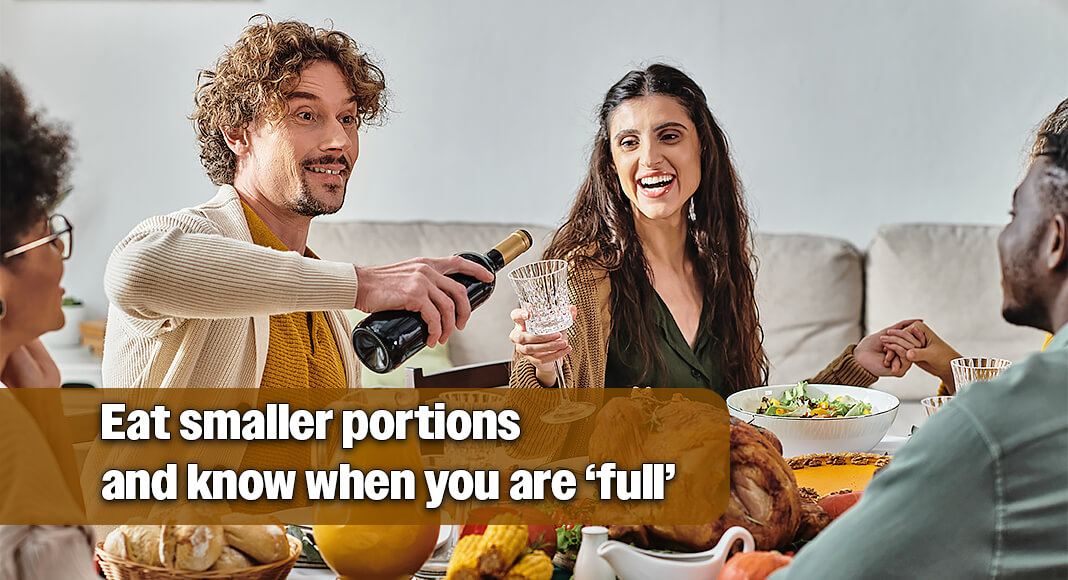
Mega Doctor News
By UT Southwestern Medical Center
Newswise – DALLAS – We’ve all been there: You’re gathered with family or friends for a delicious holiday meal. You start piling food on your plate, and before you know it, there’s no room left – and you haven’t even made it to the cranberry sauce and sweet potatoes.
But it doesn’t have to go that way, says a nutrition expert at UT Southwestern Medical Center. You can take a different approach to holiday meals that will keep you from overindulging – and regretting it later when you feel like a stuffed turkey.

“Before jumping into the holiday buffet, take your time to scan all that is there,” said Lona Sandon, Ph.D., Associate Professor in the Department of Clinical Nutrition in the School of Health Professions. “Pick the foods that you most want to try and take a small portion. Focus on the flavor and texture of your favorite foods. Set your fork or spoon down between bites.”
The communication between the stomach and the brain is a complex process that runs through a pathway called the gut-brain axis to regulate food portions. The stomach signals its fullness to the brain as it stretches with food and releases hormones that signal satiety, or the feeling of being full. The brain responds by decreasing appetite.
“If we aren’t paying attention to this feeling, we can easily overeat,” Dr. Sandon said. “The greater variety of foods and flavors we have on our plate, the more likely we may be to eat more than needed.”
The carbohydrates, protein, and fat in foods also trigger hormones such as insulin and leptin to shut down appetite, but it takes awhile for this to happen, Dr. Sandon explained. So if you eat too fast during holiday meals, you won’t get these signals until it’s too late.
The combination of fat, salt, and sugar in many foods that are holiday traditions also can drive the desire to eat more. Both the tongue and the brain find this combination pleasurable, Dr. Sandon said. On the other hand, foods high in fiber and lean protein help us feel full and satisfied.
Healthy foods for football tailgating
Cut-up fruit with yogurt dip or cut-up veggies with light ranch dressing are always a good way to go. Fruits and veggies are high in water, which helps keep you hydrated.
Salsa, pico de gallo, or guacamole are good go-to dips for chips.
Fried foods can be switched out with grilled or baked for healthier options. Instead of fried wings, try baked wings.
Swap out beer or wine with sparkling water. Mix it with a splash of cranberry juice for a festive-looking drink. Add cut-up fresh fruit.
How to avoid overeating
Dr. Sandon said one helpful strategy for holiday eating is to use MyPlate, the U.S. Department of Agriculture’s (USDA) guide for making healthy food choices by dividing a plate into the five food groups: fruits, vegetables, grains, protein, and dairy. The USDA offers a personalized MyPlate Plan calculator, available online or via an app.
“Fill at least half your plate first with salad, vegetables, and fruits,” Dr. Sandon said. “With the space left, add one serving spoon of your favorite foods. For portion hacks, think of a standard ice cream scoop, about one-third cup. One to two scoops of green bean casserole or mashed potatoes would be a good serving. You might also keep in mind a typical single-serve yogurt cup for things like sweet potatoes and cooked vegetables.”
Holiday hosts also should keep healthy eating in mind when preparing for their guests, she said. Using smaller plates, cups, and serving utensils, as well as avoiding overfilling serving dishes, can help reduce the amount of food and beverage consumption. Folks tend to serve themselves larger portions when dishes are piled higher.
“I’m always a fan of using smaller cocktail plates and cups to manage portions,” said Dr. Sandon, Director of the Master of Clinical Nutrition – Coordinated Program at UTSW. “They limit you without you having to think about it.”
Exercise and watch the alcohol
And remember, the holidays aren’t a monthlong free pass to eat more than usual, Dr. Sandon said. Save those savored holiday foods and treats for special occasions and stick to your regular eating and exercise habits leading up to those days and afterward.
Even while you’re enjoying all those tasty foods, you can squeeze in activities geared to work off some of the extra calories. Organize a family walk or backyard football game after the holiday meal. Create a new tradition of participating in a holiday charity run/walk.
When it comes to holiday beverages, too much alcohol may leave you dehydrated and cause other symptoms such as headaches. Alcohol also can keep you from getting quality sleep, so limit alcohol intake to mealtimes; one drink or fewer per day for women, two or fewer for men, Dr. Sandon advised. Drinking alcohol before a meal may make you want to eat more.
Another good reason not to overindulge at the holiday table is because it can leave you feeling sluggish and may cause indigestion or acid reflux, both of which can keep you from sleeping well, Dr. Sandon said.
The holidays are a time to enjoy foods we don’t often eat, so it’s best to focus on relishing them and skipping those you can eat anytime. For instance, if you want sweet potato pie, skip that second serving of mashed potatoes and have a slice of pie instead.
Or maybe you don’t need that whole piece of pie?
“Generally, you do not need to eat much to satisfy a craving,” Dr. Sandon said. “A half-slice of pie can be just enough. Share with someone.”
After all, the holidays are a time for giving, right?
Related Stories
Give yourself the perfect gift: Trim your holiday stress
Navigating pregnancy over the holidays: Your guide for traveling, shopping, and hosting
Boundaries, respect keys to political discussions at holiday family gatherings
Liver cancer growth tied to tryptophan intake
About UT Southwestern Medical Center
UT Southwestern, one of the nation’s premier academic medical centers, integrates pioneering biomedical research with exceptional clinical care and education. The institution’s faculty members have received six Nobel Prizes and include 24 members of the National Academy of Sciences, 25 members of the National Academy of Medicine, and 13 Howard Hughes Medical Institute Investigators. The full-time faculty of more than 3,200 is responsible for groundbreaking medical advances and is committed to translating science-driven research quickly to new clinical treatments. UT Southwestern physicians provide care in more than 80 specialties to more than 140,000 hospitalized patients, more than 360,000 emergency room cases, and oversee nearly 5.1 million outpatient visits a year.









